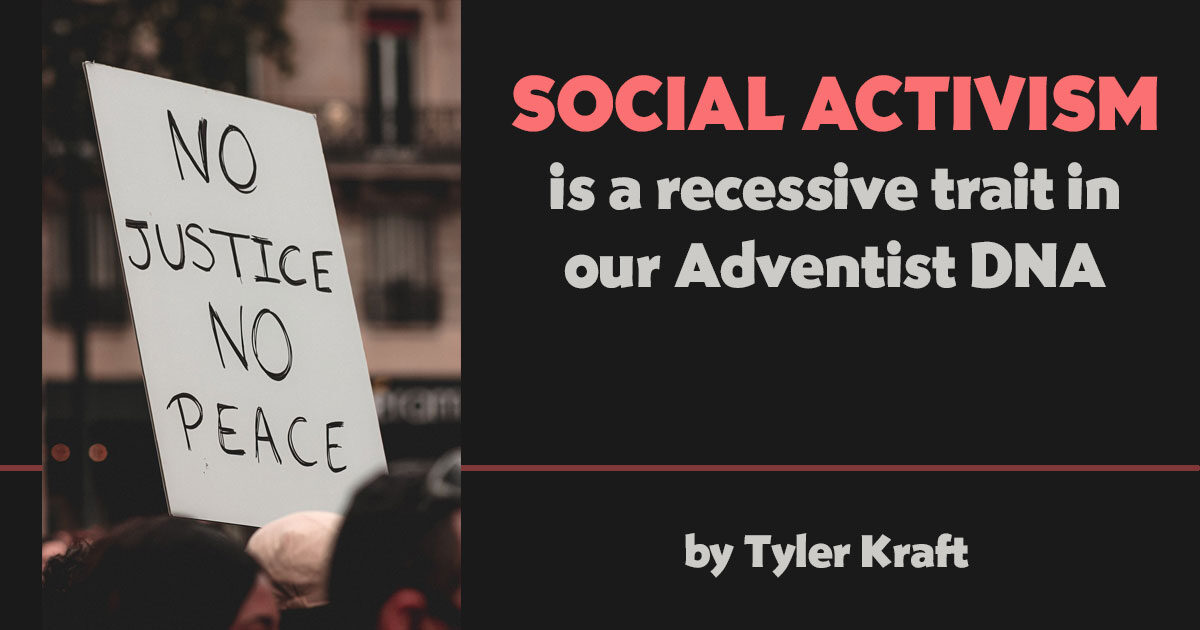Social Activism: A Recessive Trait in Adventist DNA
by Tyler Kraft | 3 June 2025 |
When I was in high school, I struggled mightily with biology: it was a sea of confusing terms and concepts that never seemed to click. But I understood genetics: Punnett squares, dominant traits, and recessive genes all clicked.
As a pastor I haven’t had much reason to study genetics. Yet as I look at our denomination, the concept that traits could be passed down for generations, remaining recessive until suddenly expressed, provides a powerful metaphor for understanding our history. Like blue eyes that can remain hidden in a family’s genetic lineage for generations before suddenly appearing in a newborn, certain theological and social traits are embedded in Seventh-day Adventist denominational DNA. Some, such as Sabbath-keeping and the state of the dead, have remained dominant through the years. Others, however, have become recessive: dormant but still present within our genetic makeup.
One such recessive trait is prophetically inspired social activism. Once dominant in early Adventism, this strand of denominational DNA has been suppressed for over a century. Even though we are no longer known for social activism, it is crucial to who we are. And it is vital that we rediscover this trait if we hope to faithfully carry out the mission that God has entrusted to us—because neglecting social justice is spiritual injustice.
Our social activism roots
The Millerite movement is often discussed solely in terms of William Miller’s interpretations of prophecy and the prediction that Jesus would return on October 22, 1844. This is incomplete historical narrative. While Miller was indeed preaching about Christ’s imminent return, another crucial component of his message was a passionate call for the United States to abolish slavery.
Dr. Kevin Burton, the Director for Adventist Research at Andrews University, has pointed out that abolitionism wasn’t peripheral to the Millerite movement; it was central. Many were expelled from their churches not merely for believing in Christ’s soon return, but because they had become convinced of the urgent moral necessity to end slavery.
Miller didn’t start out as an abolitionist. He initially reasoned that since Jesus was coming soon, social problems like slavery would be resolved at the Second Coming. Another believer, Henry Jones, convinced Miller that it was precisely because Jesus was coming soon that Christians needed to do everything possible to eradicate the sin of slavery. Who would want to meet their Maker with the stain of slavery on their conscience?
Abolitionism became deeply embedded in early Adventists’ understanding of biblical prophecy. Adventist pioneers interpreted Revelation 18:1-4, which speaks of Babylon’s “excessive luxuries” and calls God’s people to “come out of her,” as a direct reference to the slave trade. Verse 13 specifically mentions “human beings sold as slaves” as part of Babylon’s commerce.
Early Adventist pioneers, including Joseph Bates, Ellen White, Uriah Smith, and J.N. Andrews, were disproportionately represented among abolitionists at a time when only 1-2% of the northern population of the United States supported abolition. They were genuinely radical, motivated by their prophetic understanding. These pioneers didn’t merely theorize about freedom for slaves and giving them equal rights. They understood that neglecting social justice was spiritual injustice, and they took concrete action.
They signed and circulated petitions to Congress, operated stores that only sold goods not produced by slave labor, and directly defied unjust laws. Ellen White explicitly instructed believers to disobey the Fugitive Slave Act, regardless of consequences. This was no small matter. Violating this law carried a $3,000 fine – three years’ salary for the average person – plus six months in jail. She insisted that this was a moral issue where obeying God rather than man was non-negotiable.
Surveillance, threats, and submission
What caused this once-dominant trait of social activism to become recessive in Adventist DNA? Recent research by Dr. Burton has unearthed over 2,500 declassified documents that reveal a pivotal institutional shift.
During World War I, the Bureau of Investigation—now known as the Federal Bureau of Investigation—began targeting the Seventh-day Adventist Church. Remarkably, they classified Adventists as potentially dangerous “liberals” based on our publications. FBI agents infiltrated churches and camp meetings, intercepted mail and telegrams, and attempted to disrupt church operations. Eventually, they confronted Adventist leaders with threats of imprisonment if certain teachings weren’t modified. (These weren’t idle threats: the FBI had already imprisoned Jehovah’s Witness leaders, which demonstrated their willingness to take severe action against religious groups they deemed subversive.)
A major concern of the FBI was the Adventist interpretation of Revelation 13, where we identified the United States as the earth beast that “had two horns like a lamb but spoke like a dragon.” The symbolism was understood to represent America’s claimed principles of religious liberty and civil liberty, which stood in stark contrast with its tyrannical actions of religious persecution and slavery and racial oppression.
Faced with these threats, Adventist leaders made a significant theological shift. For example, in the popular denominational publication Bible Readings for the Home Circle, where the 1916 edition clearly identified that the United States was currently the earth beast of Revelation 13, the 1918 edition said that the United States would become the earth beast only at some future point when religious liberties were trampled.
After this, our denomination stopped emphasizing current social injustices and instead focused exclusively on a future threat to religious liberty. Civil liberties ceased being an immediate concern. The church turned a blind eye to the suffering of Black Americans and other minorities, while fixating on potential future religious persecution.
The decision to acquiesce to governmental pressure has cost our denomination dearly, leading to conflicts and problems that might never have emerged had the church maintained its pioneers’ position on social justice. After more than a century of social activism functioning as a recessive rather than dominant trait, countless people, both inside and outside Adventism, now see our denomination as disengaged from civil justice. Many of our members are content to wait passively for Jesus to fix things at His return. To suggest being active in social justice work is met with obstinance, if not outright hostility.
I have heard from numerous members and pastors alike that we need to be focused on spiritual matters, not civic or social issues. They contend that being prepared spiritually is what ultimately matters when Jesus comes again. Yet the Bible clearly connects spiritual development with social engagement. It is an inescapable truth that neglecting social justice is spiritual injustice.
Prophetic justice
Scripture repeatedly calls believers to engage with issues of justice. One of the clearest and most well-known examples is given by the prophet Micah, who summarizes the divine requirements succinctly: “He has shown you, O mortal, what is good. And what does the Lord require of you? To act justly and to love mercy and to walk humbly with your God” (Micah 6:8).
Acting justly requires tangible action, not passive anticipation. Sometimes this means direct service, like providing food to hungry people. But justice work also requires addressing systemic causes of suffering: investigating why so many people are experiencing food insecurity and working to reform systems that perpetuate it.
The commitment to justice shouldn’t be derailed by partisan politics: our efforts should not be about promoting one party over another, but about serving people. Sometimes that means collaborating with Republican politicians who have good ideas to help vulnerable populations, and other times it will mean working with Democratic politicians who are engaged in protecting people from injustice. It might involve writing petitions to Congress, participating in protests, or even risking conflict with governmental authorities.
The essential point is that doing justice must look like something. One cannot do justice while sitting silently on the sidelines. Justice requires action, not just hoping and praying for Jesus to resolve things. Modern Adventists need to learn the lesson that William Miller did all those years ago: that the soon coming of Jesus means we need to be more involved with social and civic issues, not less.
Yes, it will make us uncomfortable. Justice work challenges established norms and power structures. But we shouldn’t be so addicted to comfort that we are willing to disobey divine mandates. There are many ways to effect this, but we only need to watch the news for five minutes to find some people who are facing social, legal, or financial injustice. At this moment in history, at least here in the United States, we cannot have the same passive approach that has characterized much of our recent past.
Reactivating our spiritual DNA
I say again: prophetically inspired social activism remains a recessive trait within Adventist DNA, waiting to be expressed again. By reconnecting with this heritage, our church can reclaim its pioneers’ understanding that social justice and spiritual faithfulness are inseparable. They were willing to risk financial ruin, imprisonment, and even their lives to stand against injustice. Contemporary Adventists must examine themselves to know whether we possess a similar commitment. Are we willing to do what God has asked—to do justice, love mercy, and walk humbly with Him—even if it costs us?
I don’t want to meet my maker with my conscience stained by the fact that while I prayed for people dealing with injustice, I never lifted a finger to help them. At the end of the day, the question is not whether we can afford the discomfort of engaging in justice work, but whether we can afford the spiritual consequences of avoiding it.
Because neglecting social justice is spiritual injustice.

Tyler Kraft is the pastor of the Hayward Adventist Church in California. He is a graduate of Pacific Union College and the Adventist Theological Seminary, and holds a doctoral degree in Organizational Leadership from Andrews University. He’s married to Crystal, with whom he enjoys serving Jesus. He is the author of the upcoming book The Strength of Samson.




